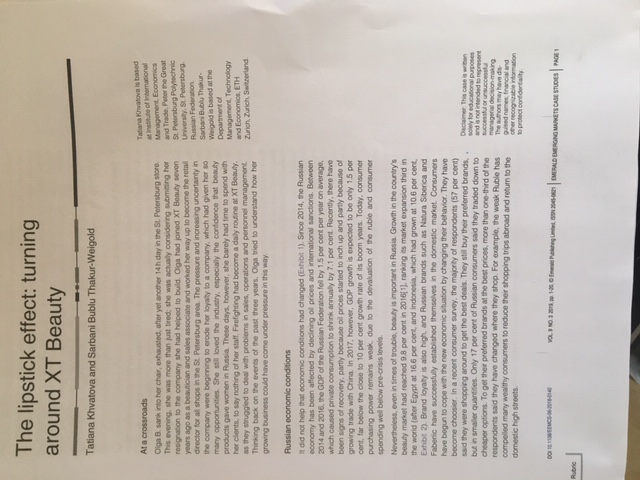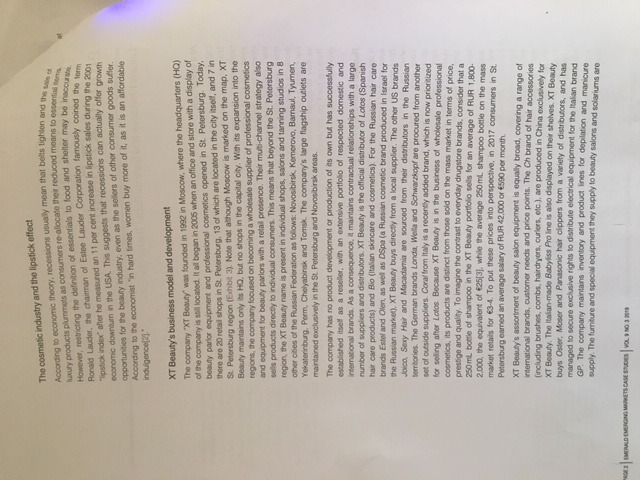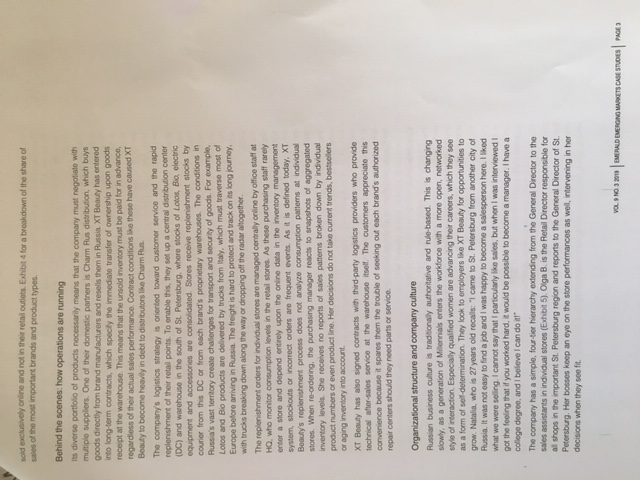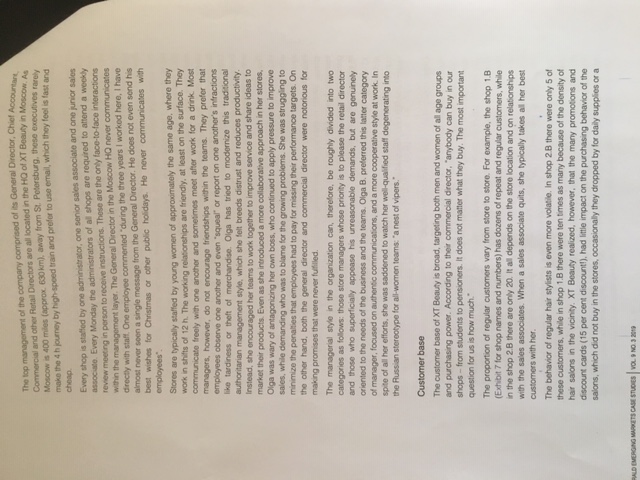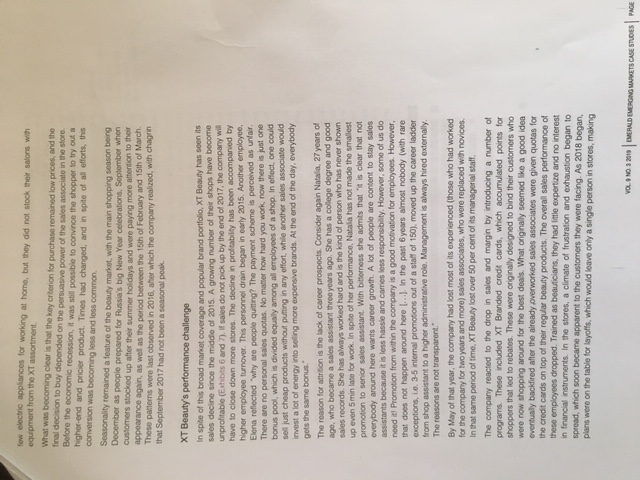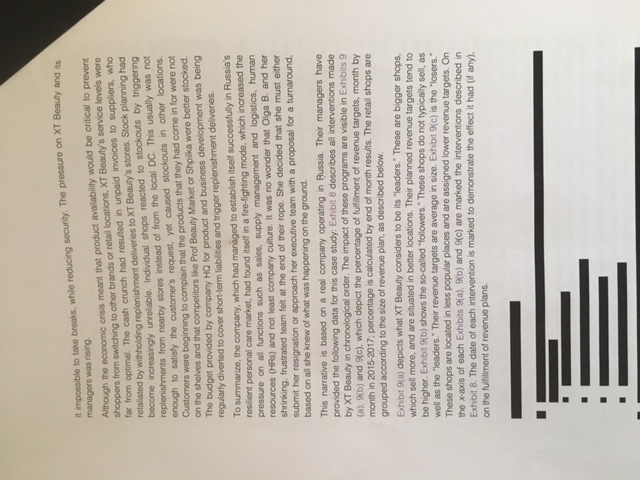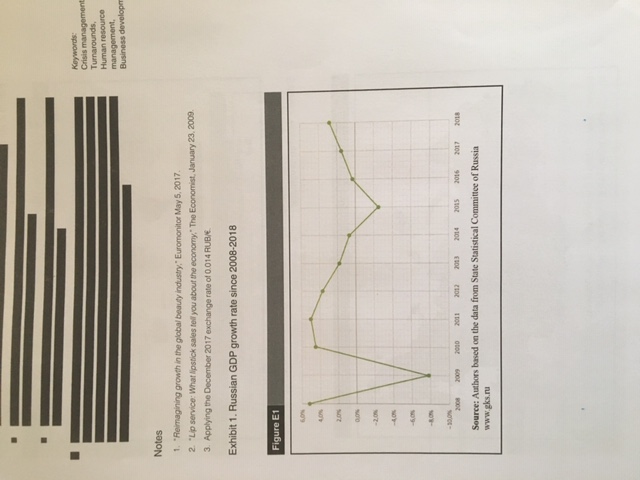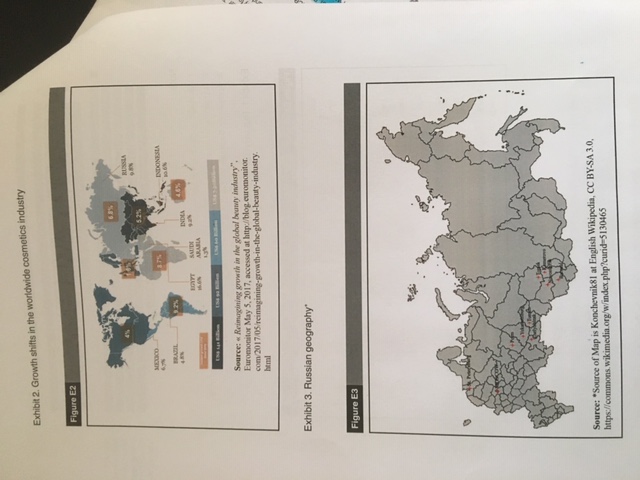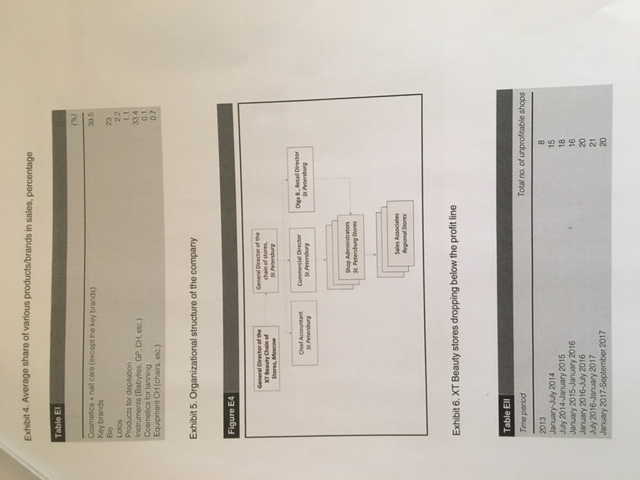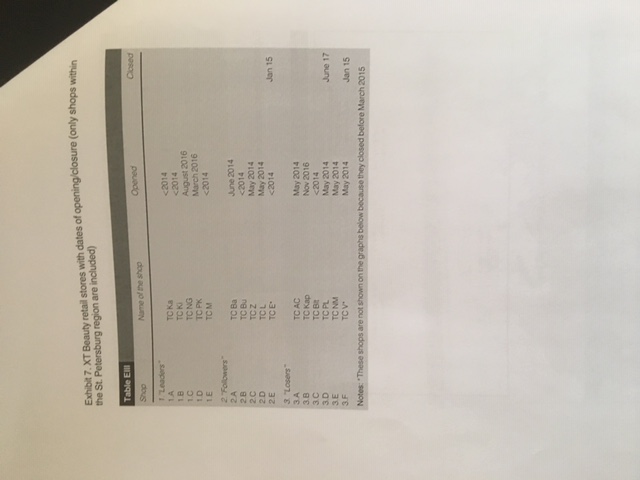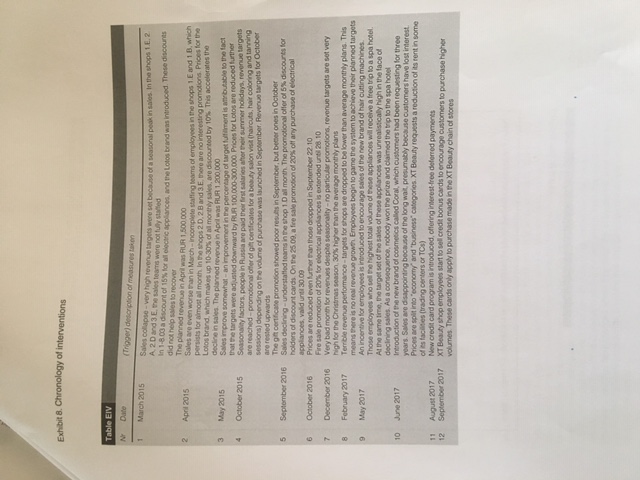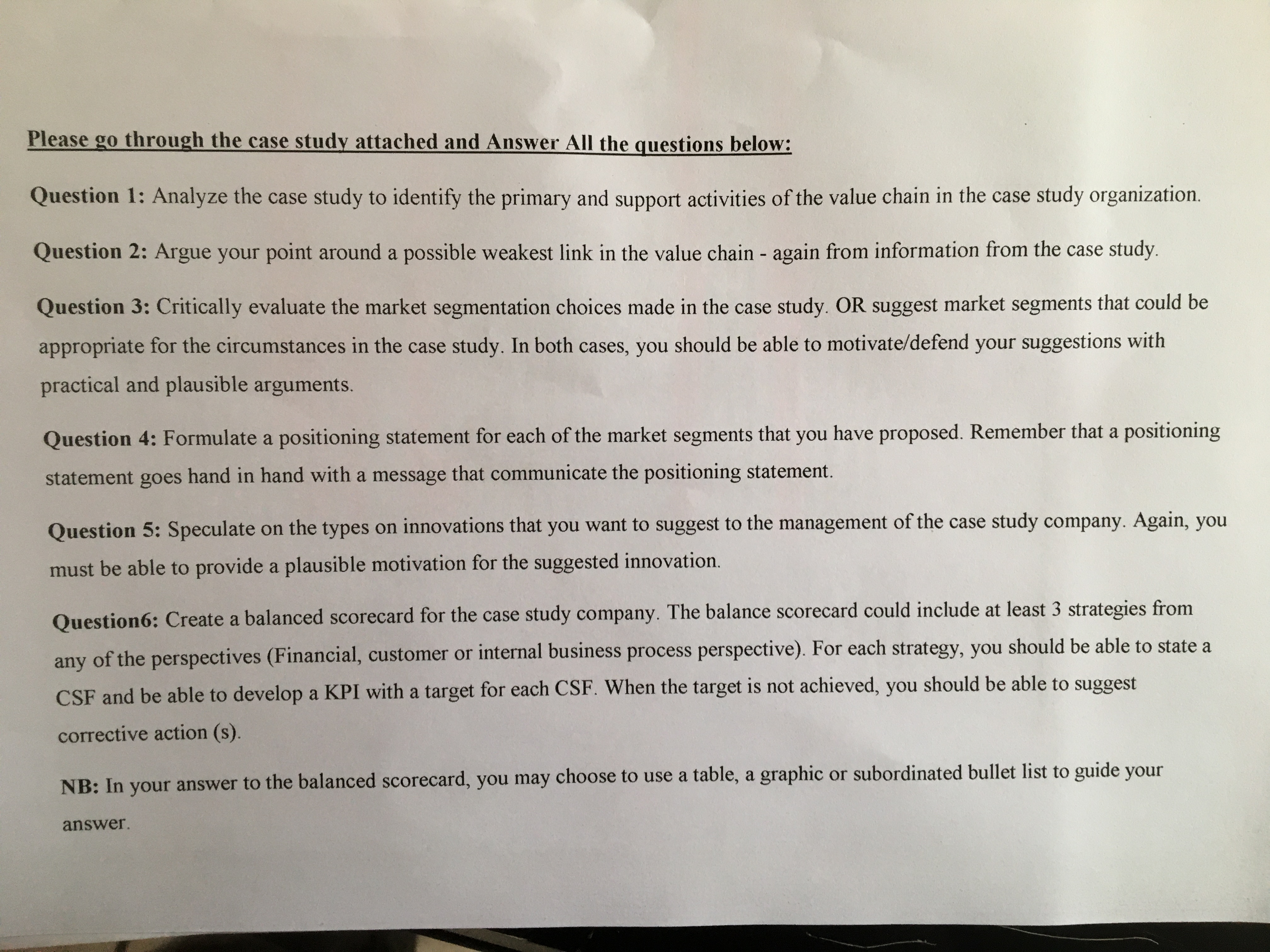\f\f\fThe top management of the company comprised of its General Director, Chief Accountare Commercial and other Retail Directors are all located in the HQ of XT Beauty in Moscow. As Moscow is 400 miles (approx. 630 km). away from 51. Petersburg. these executives rarely make the 4 h journey by high-speed train and prefer to use email, which they feel is fast and choop. Every shop is staffed by one administrator, one senior sales associate and one junior sales associate. Every Monday the administrators of all shops are required to attend a weekly review meeting in person to receive instructions. Those are the only face-to-face interactions within the management layer. The General Director in the Moscow HQ never communicates directly with stall. One employee commented "during the three years I worked here, I have almost never soon a single message from the General Director. He does not even send his best wishes for Christmas or other public holidays. He never communicates with employees". Stores are typically staffed by young women of approximately the same age, where they work in shifts of 12 h. The working relationships are friendly. at least on the surface. They communicate Inpoly with one another and sometimes moot after work for a drink. Most managers, however, do not encourage friendships within the teams. They profer that employees observe one another and oven "squeal" or report on one another's infractions like tardiness or theft of merchandise. Olga has tried to modernize this traditional authoritarian management style, which she felt broods distrust and reduces productivity. Instead, she encouraged her teams to work together to improve service and share ideas to market their products. Even as she introduced a more collaborative approach in her stores, Olga was wary of antagonizing her own boss, who continued to apply pressure to improve sales, while demanding who was to blame for the growing problems. She was struggling to minimize the penalties that employees had to pay for missing their performance targets. On the other hand, both the general director and commercial director were notorious for making prom sos that were never fulfilled. The managerial style in the organization can, therefore, be roughly divided into two categories as follows: those store managers whose priorty is to please the retail director and those who superficialy appease his unreasonable demands, but are genuinely oriented to the noods of the business and the teams. Olga B. preferred this latter category of manager, focused on authentic communications, and a more cooperative style at work. In spite of all her efforts. she was saddened to watch her well-qualified stall degenerating into the Russian storootypo for all-women toams: "a nost of vipers." Customer base The customer base of XT Beauty is broad, targeting both mon and women of al age groups and purchasing power. According to their commercial director, "anybody can buy in our shops - from students to pensioners. It does not matter what they buy. The most important question for us is how much." The proportion of regular customers vary from store to store. For example, the shop 1.B (Exhibit 7 for shop names and numbers) has dozens of repeat and regular customers, while in the shop 2.8 there are only 20. It all depends on the store location and on relationships with the sales associates. When a sales associate quits, she typically takes all her best customers with her. The behavior of regular hair stylists is even more volatile, In shop 2 B there were only 5 of those customers, while in shop 1.B there were ten times as many because of the density of hair salons in the vicinity. XT Beauty realized, however, that the many promotions and discount cards (15 per cent discount!), had little impact on the purchasing behavior of the salons, which did not buy in the stores, occasionally they dropped by for daily supplies or a G MAPPUTS CAME STUDIES TOLD NO.3 210fow electric appliances for working at home, but they did not stock their salore with equipment from the XT assortment What was becoming clear is that the boy criterion for purchase remained low prices, and the final decision to buy depended on the persuasive power of the sales associate in the store. Before the economic recession, it was still possible to convince the shopper to try out a higher-end and pricier product. Times had changed, and in spite of all offorts, this poriversion was becoming loss and loss common. Seasonality remained a feature of the beauty market, with the main shopping season being December as people propaned for Russia's big Now Year celebrations, September when customers stocked up after their summer holidays and wore paying more attention to their appearance again, as well as the poriod between the 15th of February and 15th of March. These patterns were last observed in 2016, after which the company realized, with chagrin that September 2017 had not been a seasonal peak. XT Beauty's performance challenge In spite of this broad market coverage and popular brand portfolio, XT Beauty has soon its sales decline since the middle of 2015. A growing number of their shops have become unprofitable (Exhibits 6 and 7). II sales do not pick up by the end of 2017, the company will have to close down more stores. The decline in profitability has been accompanied by higher employou turnover. This personnel drain began in early 2015. Another employee, Elena reflected "why are people quiting? The payment schome is perceived as unfair, There are no personal sales quotas. No matter how hard you work, now there is just ono bonus pool, which is divided equaly among all employees of a shop. In effect, one could sell just cheap products without putting in any effort, while another sales associate would invest a lot of energy into selling more expensive brands. At the and of the day, everybody puts the same bonus." The reason for attrition is the lack of career prospects. Consider again Natalia, 27 years of age, who became a sales assistant threeyears ago. She has a college degree and good salos records. She has always worked hard and is the kind of person who has never shown up even 5 min late for work. In spite of her performance, Natalia has not made the smallest promotion to senior sales assistant. With bitterness she admits that it is clear that not everybody around here wants career growth. A lot of people are content to stay sales assistants because it is less hassle and camps loss responsibility. However, some of us do need it! Promotion from within the company is a good motivation for employees, However, that does not happen around here [...]. In the past 6years almost nobody (with rare exceptions, Do. 3-5 internal promotions out of a staff of 150], moved up the careor ladder from shop assistant to a higher administrative role. Management is always hired externally. The reasons are not transparent." By May of that year, the company had lost most of its experienced (those who had worked for the company for two years and more) sales associates, who wore replaced with novices. In that same period of time. XT Beauty lost over 50 per cent of its managerial stall. The company reacted to the drop in sales and margin by introducing a number of programs. These included XT Branded credit cards, which accumulated points for shoppers that led to rebates. These were originally designed to bind their customers who wore now shopping around for the best deals. What originally seemed like a good idea eventually backfired after the already overworked sales associates were given quotas for the credit cards on top of their regular beauty products. The overall sales performance of these employees dropped. Trained as beauticians, they had little expertize and no interest in financial instruments. In the stores, a climate of frustration and exhaustion began to spread, which soon became apparent to the customers they were facing. As 2018 began, plans were on the table for layoffs, which would leave only a single person in stores, making VOL FIND 3 2019|EMERALD EMERGING MARKETS CASE STUDIES PAGEit impossible to take breaks, while reducing security. The pressure on XT Beauty and its managers was rising Although the economic crisis meant that product availability would be critical to prevent shoppers from switching to other brands or retail locations, XT Beauty's service love's wore far from optimal. The cash crunch had resulted in unpaid invoices to suppliers, who retaliated by withholding replenishment deliveries to XT Beauty's stores. Stock planning had become increasingly unreliable. Individual shops reacted to stockouts by triggering replenishments from nearby stores instead of from the local DC. This usually was not enough to satisfy the customer's request, yet caused stockouts in other locations. Customers wore beginning to complain that the products that they had come in for were not on the shelves and that competitors like Prof Beauty Market or Shpilka were better stocked. The budget provided by company HQ for product and business development was being regularly diverted to cover short-term liabilities and trigger replenishment deliveries. To summarize, the company, which had managed to establish itself successfully in Russia's resilient personal care market, had found itself in a fire-fighting mode, which increased the pressure on all functions such as sales, supply management and logistics, human resources (HRs) and not least company culture. It was no wonder that Olga B. and her shrinking, frustrated team felt at the end of their rope. She decided that she must either submit her resignation or approach her executive team with a proposal for a turnaround, based on all she knew of what was happening on the ground. This narrative is based on a real company operating in Russia. Their managers have provided the following data for this case study: Exhibit 8 describes all interventions made by XT Beauty in chronological order. The impact of these programs are visible in Exhibits 9 (a). 9(b) and 9(c), which depict the percentage of fulfillment of revenue targets, month by month in 2015-2017: percentage is calculated by end of month results. The retail shops are grouped according to the size of revenue plan, as described below. Exhibit 9(a) depicts what XT Beauty considers to be its "leaders." These are bigger shops, which sell more, and are situated in better locations. Their planned revenue targets tend to be higher. Exhibit 9(b) shows the so-called "followers." These shops do not typically sell, as well as the "leaders." Their revenue targets are average in size. Exhibit 9(c) is the "losers." These shops are located in less popular places and are assigned lower revenue targets. On the x-axis of each Exhibits 9(a), 9(b) and 9(c) are marked the interventions described in Exhibit 8. The date of each intervention is marked to demonstrate the effect it had (if any). on the fulfillment of revenue plans.\f\f\f\f\f\f
